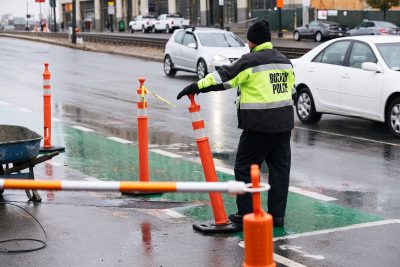
Approximately 20 people attended a Boston City Council meeting Tuesday for a hearing on increased investments in mental health clinicians in the Boston Police Department.
Councilor Annissa Essaibi-George and Councilor Ayanna Pressley, both members of the Council’s Committee on Homelessness, Mental Health and Recovery, sponsored the hearing, according to the hearing order.
Essaibi-George started the meeting by describing a program called the Boston Emergency Services Team, which provides mental health clinicians to ride along with BPD officers and first responders.
“The BEST program provides officers with support when they encounter people in crisis situations,” Essaibi-George said. “This partnership is amazing because it … enhances the safety of those struggling with mental illnesses and it protects the safety of our Boston police officers who respond to calls when a mental illness is afflicting a resident.”
Essaibi-George said 67 percent of men and 75 percent of women in Suffolk County prisons experience both substance use disorders and mental health disorders, which is why programs like BEST need to be expanded to improve Boston’s criminal justice system.
“In these cases, mental health professionals can help de-escalate situations and try a path to treatment instead of incarceration,” Essaibi-George said.
Pressley, who spoke next, said the expansion of this program would improve Boston’s criminal justice system.
“Although our dedicated Boston police officers do receive specialized training, I believe licensed clinicians are best suited to access and to de-escalate situations with an emotionally disturbed person,” Pressley said. “Each police district should have a dedicated clinician … to ensure an improved, more holistic and more coordinated response.”
Boston Police Commissioner William Evans also spoke in support of the BEST program during the hearing.
Evans said these clinicians improve calls involving those with mental illnesses and allow for officers to get individuals the help they need.
“Over the last two years, we’ve … arrested 25 percent less [people] and we want to continue that goal,” Evans said. “Locking up emotionally disturbed individuals isn’t the solution. It’s getting them the care [they need].”
Without a proper expert, Evans said, many people end up getting arrested unnecessarily.
“The more we can do to assist our officers in the field … the better off we are,” Evans said. “Whether it’s dealing with the opiate crisis or the mental health [crisis], it’s currently a big issue for us.”
Following speeches from city officials, Hope Haff, 78, of Jamaica Plain, a former mental health clinician, gave a public testimony to the council.
Haff said throughout the course of her work, many mentally ill patients ended up in the courts due to a lack of help for them in the system.
“I worked with many poor clients who did end up involved with the courts,” Haff said. “It was immensely stressful for the family and for the mentally ill child and quite expensive for the public … [Now,] it seems like there’s a lot more diversion available, although maybe not as much as we need.”
Andrea Amador, 45, of Hyde Park, said after the hearing that she was happy the city was finally recognizing a way to improve the mental health care system.
“We’re very happy that the city is concerned with supporting the behavioral health needs of our citizens,” Amador said. “By working with the police force yet again, Boston is pretty innovative in saying, ‘How do we help people early and get them the support they need?’”
Breanne is a former editor-in-chief and city news editor. She is a senior in the College of Communication and an oxford comma enthusiast. Follow her on Twitter @breannekovatch.




